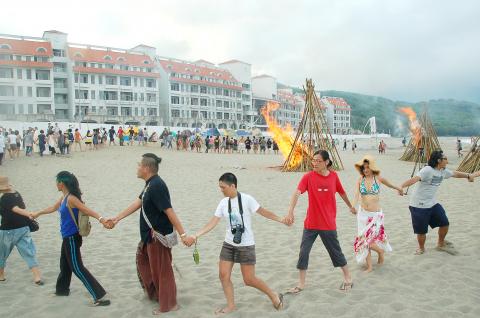After a month of continuous protests through art performances, activists and Amis Aborigines at Shanyuan Bay (杉原灣), Taitung County, who oppose the construction of a beachfront Meiliwan Resort Hotel gathered by the thousands again yesterday for a ritual ceremony at the beach.
The “besiege and fence” project by artists and activists to protest against the build-operate--transfer project was launched on June 10, followed by sit-ins and performances during the following month.
The Taitung County Government is suspected of illegally segmenting the land to avoid the need for an environmental impact assessment. After being sued by local residents and with a court ruling last year ordering a halt to construction, the county government -nevertheless authorized construction and issued licenses to the developer.

Photo: Chang Tsun-wei, Taipei Times
Construction was continuing as of press time.
About 20 environmental groups, community development organizations and civic groups gathered at the beach yesterday for a large-scale protest called “Thousands of people hold hands hohaiyan.”
Hohaiyan, a term often used in Aborigine folk songs, sounds like “shout to the ocean” in Mandarin, said Mayaw Biho (馬躍比吼), one of Taiwan’s most prolific Aboriginal documentary filmmakers. “That’s why we use it to symbolize our goal of protecting the ocean.”
The half-day protest began in the afternoon with elderly Amis, who led participants in a ritual prayer for blessings. The elders said they had lived in harmony with the ocean for generations and could not understand why the area was now being sold to private corporations.
Hand in hand, the protesters shouted that the resort hotel should be torn down and that construction that intrudes on Aborigine land rights and ignores the oceanic ecology must cease immediately.
Later on, the groups started a ritual symbolizing firing opposition toward the resort hotel.
“We want the government to know that while you are celebrating the Republic of China centenary, we are facing a bloody and tearful centenary,” Mayaw Biho said, adding that Aborigines had shared fish and the ocean with each other for centuries and would not yield the ocean to corporations.
Aborigines in eastern Taiwan are becoming increasingly deprived of their land rights, which is reminiscent of what happened to tribes in western parts of the country in the past century as economic development led to a boom in construction, Mayaw Bih said.
Continuing into the night, more than 20 groups and bands performed at the beach, including Aboriginal folk singer Panai (巴奈) and Takanow (達卡鬧), a singer of Rukai (魯凱族) and Paiwan (排灣族) ancestry.
Earlier on Friday, artists and cultural workers held a press conference to protest against what they termed inappropriate development and procedural injustice by the government benefiting corporations at the expense of residents.
“Developing tourism doesn’t mean you must exploit the land. You must get to know the local culture in depth and respect local Aborigines. Then you can decide what to do,” said a tearful Takanow, a resident near Sansiantai (三仙台), which is also threatened by construction.
“I came to Taiwan 15 years ago and I love Taiwan. However, do you think I like Taiwan because there are huge resort hotels everywhere? No. I love Taiwan because of the unique natural environment and unique Aboriginal cultures,” musician and environmental activist Matthew Lien said.

An essay competition jointly organized by a local writing society and a publisher affiliated with the Chinese Communist Party (CCP) might have contravened the Act Governing Relations Between the People of the Taiwan Area and the Mainland Area (臺灣地區與大陸地區人民關係條例), the Mainland Affairs Council (MAC) said on Thursday. “In this case, the partner organization is clearly an agency under the CCP’s Fujian Provincial Committee,” MAC Deputy Minister and spokesperson Liang Wen-chieh (梁文傑) said at a news briefing in Taipei. “It also involves bringing Taiwanese students to China with all-expenses-paid arrangements to attend award ceremonies and camps,” Liang said. Those two “characteristics” are typically sufficient

A magnitude 5.9 earthquake that struck about 33km off the coast of Hualien City was the "main shock" in a series of quakes in the area, with aftershocks expected over the next three days, the Central Weather Administration (CWA) said yesterday. Prior to the magnitude 5.9 quake shaking most of Taiwan at 6:53pm yesterday, six other earthquakes stronger than a magnitude of 4, starting with a magnitude 5.5 quake at 6:09pm, occurred in the area. CWA Seismological Center Director Wu Chien-fu (吳健富) confirmed that the quakes were all part of the same series and that the magnitude 5.5 temblor was

The brilliant blue waters, thick foliage and bucolic atmosphere on this seemingly idyllic archipelago deep in the Pacific Ocean belie the key role it now plays in a titanic geopolitical struggle. Palau is again on the front line as China, and the US and its allies prepare their forces in an intensifying contest for control over the Asia-Pacific region. The democratic nation of just 17,000 people hosts US-controlled airstrips and soon-to-be-completed radar installations that the US military describes as “critical” to monitoring vast swathes of water and airspace. It is also a key piece of the second island chain, a string of

The Central Weather Administration has issued a heat alert for southeastern Taiwan, warning of temperatures as high as 36°C today, while alerting some coastal areas of strong winds later in the day. Kaohsiung’s Neimen District (內門) and Pingtung County’s Neipu Township (內埔) are under an orange heat alert, which warns of temperatures as high as 36°C for three consecutive days, the CWA said, citing southwest winds. The heat would also extend to Tainan’s Nansi (楠西) and Yujing (玉井) districts, as well as Pingtung’s Gaoshu (高樹), Yanpu (鹽埔) and Majia (瑪家) townships, it said, forecasting highs of up to 36°C in those areas